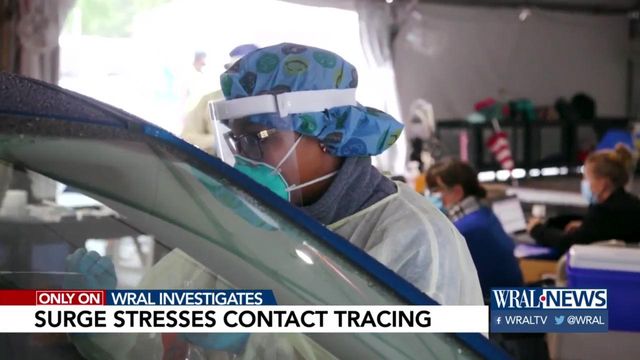As coronavirus spreads, can NC contact tracers keep up?
North Carolina's contact tracing army has grown to approximately 2,000 across the state.
Posted — UpdatedBut with more than 4,000 new cases reported on Wednesday and a rolling average above 3,000, WRAL Investigates wanted to know if contact tracing is working.
"So, being overwhelmed comes in many forms," said public health nursing supervisor Deirdre Smith.
Smith oversees 84 tracers who identify and notify known contacts to positive coronavirus patients in Wake County.
Reacting to the state’s explosive number of new cases on Wednesday, Smith said, "Just hearing the numbers can send someone in a tail spin and say we’re overwhelmed, but when you plan and properly prepare for it, it lets you know OK, this is what we should be doing next."
While Smith is confident in their plan, some argue North Carolina is still woefully short of contact tracers when you factor in our case trends.
An already daunting number of phone calls that contact tracers must make is made worse when known contacts don’t cooperate, according to Smith.
"That has always been a challenge for us because our primary form of contact is a telephone,” she added.
Smith explained that not answering the phone is just one challenge.
"We’ve heard it all. It’s not real. I don’t have it. I haven’t been exposed,” she said.
While congregate living facilities still show the highest spread, tracers in various counties are trying to drill down with warnings for all families, especially those about to celebrate Thanksgiving.
"No one is typically wearing a mask at home and it’s cold so the windows aren’t really open right now," explained Smith when discussing the holiday concerns.
While the numbers certainly raise questions about whether contact tracing is as effective as possible, Smith feels it is making a difference.
"I think contact tracing is going to work whenever you can get in touch with somebody to spread that message,” she said.
The holiday season, colder temperatures and COVID-19 fatigue are all adding up to a challenging few months ahead.
“I know that we’re tired of COVID, but COVID isn’t tired of us, so we have to be very vigilant,” urged Smith.
Related Topics
• Credits
Copyright 2024 by Capitol Broadcasting Company. All rights reserved. This material may not be published, broadcast, rewritten or redistributed.





